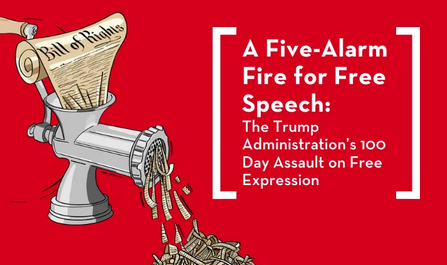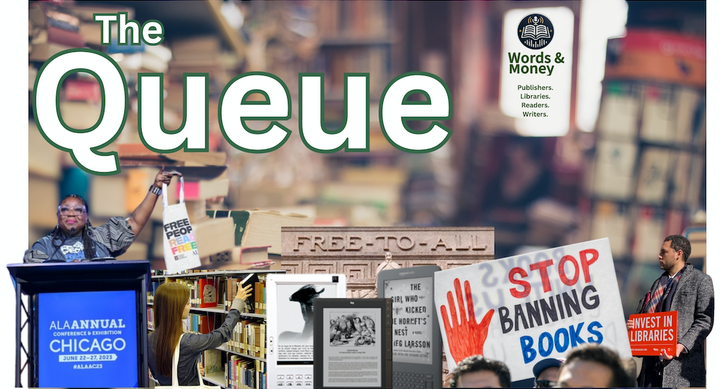PEN America: Trump’s First 100 Days a ‘Five-Alarm Fire’ for Free Speech
In a new 26-page report, PEN America explores the executive orders and actions taken by the Trump administration in its first 100 days that hold grave implications for free expression.

In the opening paragraphs of a new report on the first 100 days of the Trump administration, PEN America references the chilling video of international graduate student and aspiring children’s book author Rümeysa Öztürk being snatched off the street by plainclothes immigration officers. The apparent reason for her detention: a year-old op-ed she co-authored for the Tufts student newspaper criticizing the university’s response to the war in Gaza—a grievous enough threat for Trump officials, that, without notice, they terminated her F-1 student visa and whisked her off to a prison in Louisiana. The shocking arrest, according to PEN America, is only one part of a sweeping "frontal assault on freedom of expression” not seen since McCarthy Era.
“Through vague, vitriolic, and overbroad executive orders and other actions, the Trump administration has attacked rights, ideas, and words it doesn’t agree with, justifying some edicts by claiming an intent to liberate Americans through a twisted and false version of ‘restoring’ free speech,” the reports states. “The heavy-handed imposition of government ideology and efforts to instill a culture of fear echo the tactics of repressive regimes, and they are having the intended effect. Across not just government agencies, but schools and universities, corporations, libraries, museums, and the media, there is already a pervasive sense that one must watch what one says in order to avoid government retaliation.”
In the 26-page report, released on April 29, PEN America explores how the executive orders and actions taken by the Trump administration in its first 100 days hold grave implications for free expression.
Among the actions of concern to PEN America:
● Orders targeting diversity, equity, and inclusion, which has led to the banning of some 350 words from government use, according to PEN America’s count. “These orders represent an escalation of the ideologically restrictive attacks that have underpinned educational gag orders and book bans that PEN America has been tracking across the country since 2021; but they go further,” the report states, “stripping away the very terms necessary for serious conversation about a great many social issues.”
● Orders that call for “an unconstitutional ideological litmus test” for visa and asylum seekers, and the explicit targeting of non-citizens “in retaliation for pro-Palestinian activism” and other protected speech. “The administration has revoked more than 1,700 student visas and said it would monitor immigrants’ social media for evidence of support of antisemitic terrorism or ‘antisemitic activity,’ using language vague enough to sweep up a broad range of speech,” PEN officials report. The moves are “generating fear among non-citizens and citizens alike.”
● Orders that seek to place restrictions “on ideas and concepts across the K-12 and higher education sectors” and retaliatory actions against institutions that resist government control. “Those orders, alongside weaponized claims of an insufficient response to antisemitism on some college campuses, are being used in an attempt to bulldoze the independence of American universities, and strong-arm them into bending to the administration’s will,” the report observes, while also seeking to mandate “patriotic education” in schools and other public institutions, “putting a clear ideological stamp on education across the board.”
● Attacks on the press, including actions that threaten the funding for NPR and PBS, and “groundless claims that mainstream media is ‘corrupt’ and engages in ‘illegal’ activity,” actions administration officials cast as supporting free speech but which in fact pave the way for “disinformation.”
● Orders that have “slashed funding for museums and libraries, demanded that grant applicants swear to forgo diversity programs, ordered an ‘investigation’ of the famed Smithsonian Institute for promoting ‘improper ideology,’ and installed Trump as head of the historically apolitical Kennedy Center.
● And, orders and actions that have decimated U.S. foreign assistance, which has chilled free expression globally. “The Trump administration is waging a crippling attack on writers, journalists, artists, and activists around the world who fight for democracy and human rights,” the report states, an “ideological capture and crackdown on dissent" that has "reverberated across the world, emboldening authoritarian regimes to suppress civil society in their own countries while gutting the structures and funds that support independent voices.”
In April of 2017, PEN America issued a similar report at the end of the first Trump administration's 100 days, which also catalogued Trump's attacks on free speech, including Trump's branding of press outlets as “the enemy of the American people.” But the second Trump administration’s first 100 days represents an even more startling assault on free expression, which PEN America called “a clear and present danger” to “an open society where creativity and expression can thrive.”
While many of the president’s orders and actions are being litigated in court, the wheels of justice grind slowly, and the report urges everyone to remain vigilant in defending the freedom of expression.
“If free speech is the bedrock of democracy, fear and paranoia lay the groundwork for authoritarianism,” the report points out. “Those who choose not to concede or self-censor, who choose to speak out despite the risks, offer us the clearest path to protecting our fundamental rights and safeguarding our democracy. Courage is contagious, and we will all need more of it in the days to come.”


